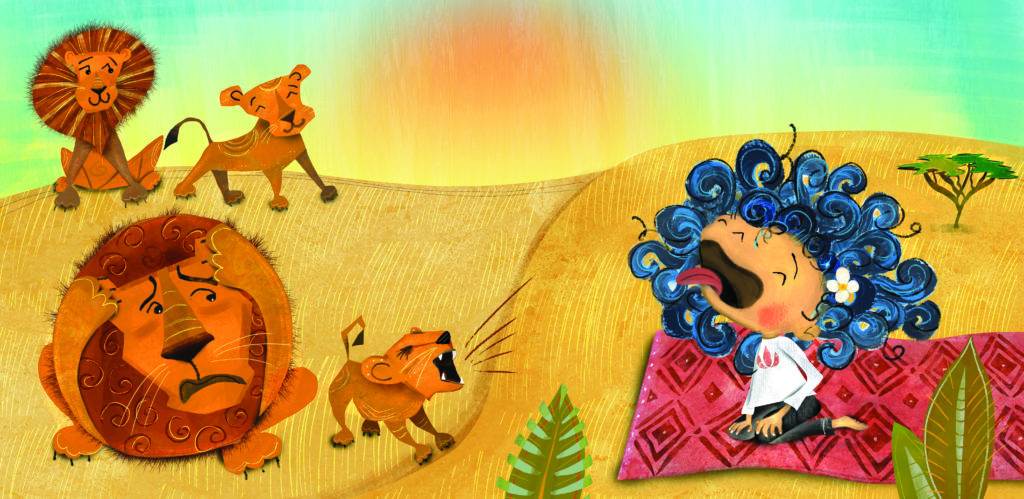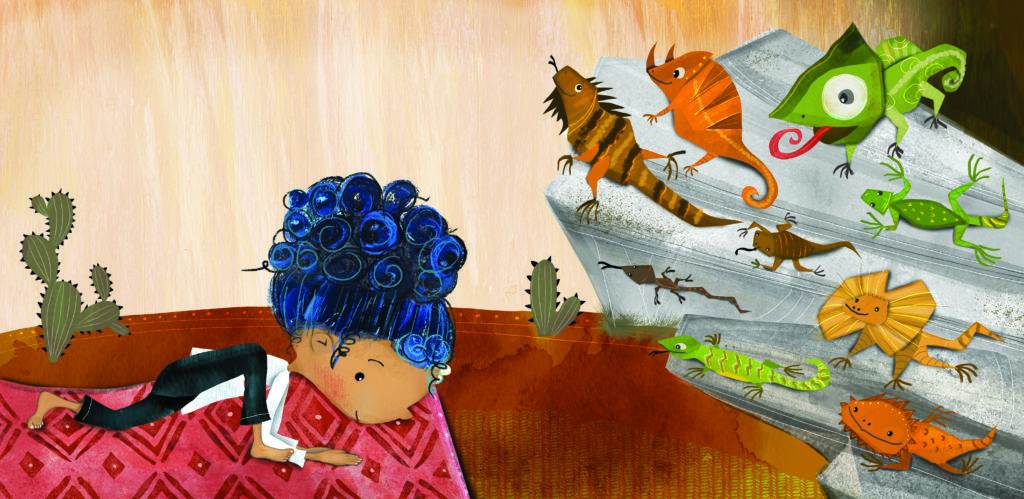You can count on animals
to make yoga fun.
BY KRISTEN FISCHER
Looking to introduce yoga to the young people in your life? There’s no better way than by showing them poses named after real-life animals.
Have children roar in Simhasana (Lion Pose) or watch them surf on their mats in Ardha Pincha Mayurasana (Dolphin Pose). Children will love acting out the postures of creatures they already know and love, which gives you the opportunity to add more poses to their flow.
In Zoo Zen: A Yoga Story for Kids, I integrate 10 animal poses into a rhyming picture book about a girl who learns yoga from creatures at the zoo. The book offers basic instruction and colorful illustrations to get the children moving. But you don’t need story time to engage children in yoga. Here are five poses that will capture and keep their attention—and hopefully turn them into devoted young yogis.
Simhasana (Lion Pose)
It’s not difficult for all ages to get on their hands and knees, but the fun of sticking out their tongues and bellowing a roar is what gives Lion Pose so much appeal for a young audience.

How to do: Kneel on a mat and sit back on your heels. Press your palms into your knees, splaying out your fingers like claws. As you breathe in through your nose, open your mouth and try to stretch your tongue to your chin. Breathe out through your mouth and let out a roar!
Merudandasana (Bear Pose)
Who can resist a good balancing pose? Go beyond the standard Vrikshasana (Tree Pose) and guide children to balance on their behinds with legs extended. If another roar slips out, so be it.
How to do: Sit with the soles of your feet together. Grab your big toes and lean back to balance on your bottom. Slowly extend your legs straight as you gaze up and continue breathing.
Padahastasana (Gorilla Pose)
This pose may look like simply bending over, but teaching it properly instructs children how to fold, which is useful for so many other poses. Kids will enjoy either stepping on the insides of their hands or gripping their toes and sticking out their elbows—both grips offer fun variations on a basic posture that they can have fun playing with.
How to do: Stand up and fold at your hips so your hands reach your toes. It’s okay to bend your knees a little. Lift up your toes and slide your hands under them, palms up, fingers parallel to your toes. Now your hands are under your feet. Breathe, focusing on lifting your hips to the sky.
Utthan Pristhasana (Lizard Pose)
Kids are naturally flexible, which makes it perfectly okay to introduce poses that probably require the rest of us to partake in a few stretch-out sessions. This funky-looking lunge helps children learn right from left while stretching the hip area.

How to do: Stand up. Then bring your palms to the ground and extend your legs back, raising your bottom up and hanging your head. Place your right foot to the right of your pinky finger. Be sure your right knee is directly above your heel and not in front of it. For a deeper stretch, rest your forearms on the ground. Keep your chin lifted and look ahead.
Mandukasana (Frog Pose)
Frog Pose may not be ideal for all adults because it’s an intense stretch, but most children will find it to be a piece of cake. Their naturally flexible legs may seem to fall easily into this pose, but they won’t be able to hop off the mat.
How to do: Come onto your hands and knees. Walk your knees out as wide as possible while still being comfortable. Bring your elbows and forearms to the ground beneath your shoulders. Keep palms flat on the ground.
Children can learn to use yoga when they want to calm down and be strong. Remind them to breathe. Use only their nose. Inhale and exhale. Feel calm in each pose.
Kristen Fischer is the author of Zoo Zen: A Yoga Story for Kids (illustrated by Susi Schaefer, SusiSchaefer.com). KristenFischer.com